Our Products
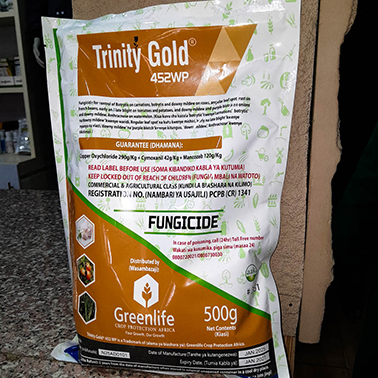
Trinity Gold 452WP
Fungicide for control of botrytis on carnations, botrytis and and downy mildew on roses, angular leave spot, rust on french beans, early and late blight on tomatoes and potatoes and downy mildew and purple blotch on onions, downy mildew and anthracnose on wateremelon.
(0/5)
Wishlist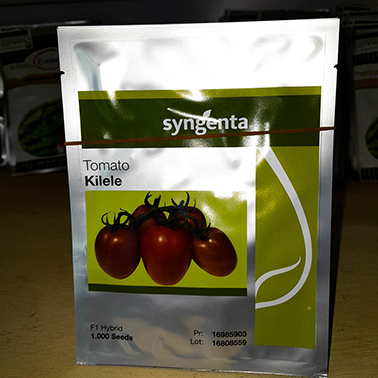
Tomato Kilele
Tomato Kilele F1 is a determinate hybrid tomato variety known for its excellent sweet taste and high yield of firm, oval-shaped fruits. Growth Habit: Determinate, meaning the plant grows to a certain height, flowers, and sets most of its fruit within a relatively short period. This makes it suitable for both bush and staked cultures. Vigor: Strong and vigorous plants with good foliage cover. Maturity: Medium early, typically maturing around 75 days after transplanting (some sources indicate 80 days). Nursery Period: 3-4 weeks.
(0/5)
Wishlist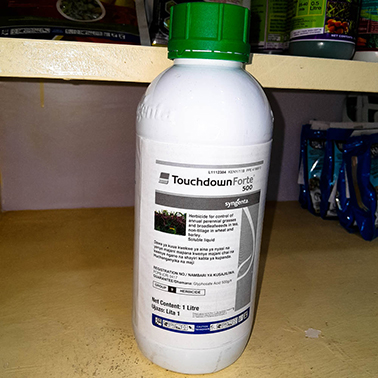
Touchdown Forte 500
herbicide for control of annual perennial grasses and broad leave weeds in tea, non-tillage in wheat and barley.
(0/5)
Wishlist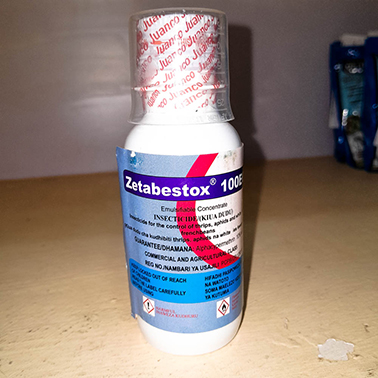
Zetabestox 100EC
Insecticide for the control of thripes, aphides, white flies on french beans.
(1.0/5)
Wishlist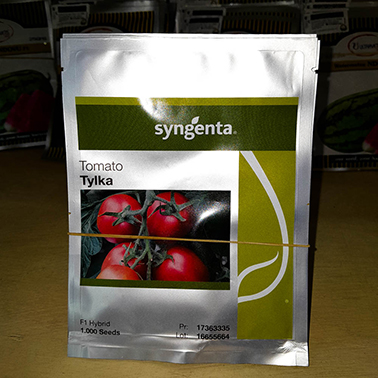
Tomato Tylka
General Characteristics: Type: Indeterminate hybrid tomato. This means the plant continues to grow, flower, and produce fruit throughout the growing season, requiring staking or support. Maturity: Medium-early to medium maturity, typically around 75 days after transplanting. Yield: Very high yielding, with potentials ranging from 70-80 tons per acre under good agricultural practices. Long harvesting period of 4 to 6 months. Adaptability: Suitable for both greenhouse and open-field cultivation. Plant Vigor: Medium to strong, with a vigorous plant that provides good foliage cover for the fruits. Fruit Characteristics: Shape: Oval or elongated, often described as "saladette" type. Color: Bright red when mature. Size/Weight: Medium-sized fruits, typically weighing 100-130 grams (though some sources mention 120-130gm). Firmness: Very firm, which is a significant advantage for transportability and shelf life. Taste: Excellent sweet taste, often highlighted as a key selling point, with a high Brix (sugar) content and no bitter aftertaste. Shelf Life: Excellent, often exceeding 21 days when harvested at the mature green stage, making it ideal for long-distance transport and market display.
(0/5)
Wishlist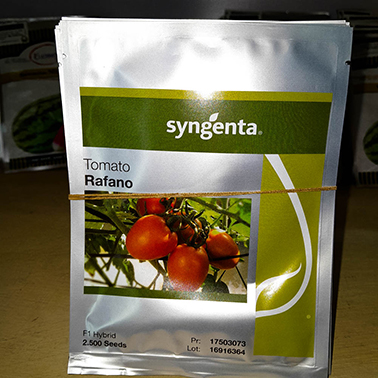
Tomato Rafano
'Rafano F1' is a popular hybrid tomato variety, particularly valued in regions with warm climates, like Kenya where you are. It's developed by Syngenta and is known for its reliability and good performance in open-field cultivation. Here's a detailed description of 'Rafano F1' tomato: General Characteristics: Type: Determinate hybrid. This means the plant grows to a specific size, sets its fruit over a relatively short period, and then stops growing. It generally requires less extensive staking than indeterminate varieties. Maturity: Early to medium maturity, typically around 75 days from transplanting. Plant Vigor: The plant is described as vigorous with good foliage cover, which is beneficial for protecting the fruits from sunscald, especially in hot climates. Yield: High yielding, with reported potentials around 30-35 tons per acre under good management. Cultivation: Primarily an open-field variety, but can perform well in cool or warm conditions. It has good hot setting capabilities, meaning it can set fruit even when temperatures are high. Fruit Characteristics: Shape: Uniform high-round to obovate (oval) shape, sometimes described as "square steak" type. Color: Attractive bright red color when fully ripe. Unripe fruits have a uniform green color. Size/Weight: Medium-sized fruits, typically weighing 100-130 grams (some sources say 120-130gm). Firmness: Very good firmness, which is a key trait for its market suitability. Shelf Life & Transportability: Excellent shelf life (over 21 days) and very good transport quality, leading to less wastage during long-distance transport. This makes it highly desirable for commercial markets. Taste/Quality: Good demand in the market, often fetching higher prices due to its attractive appearance, firmness, and good eating quality.
(0/5)
Wishlist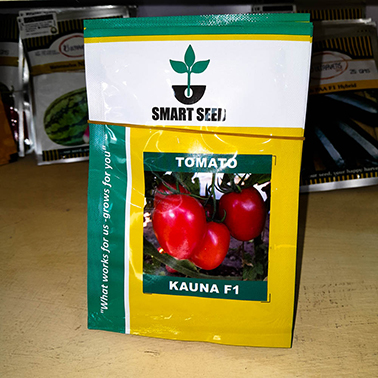
TOMATO KAUNA F1
Type: Determinate hybrid. This means the plant grows to a specific, manageable height and size, setting its fruit over a concentrated period. This makes it well-suited for open-field cultivation, often requiring less intensive staking than indeterminate varieties. Maturity: Medium-early maturity, typically around 75 days after transplanting. Plant Vigor: The plant is vigorous and has good foliage cover, which helps protect the developing fruits from sunscald, a common issue in sunny climates like Meru. Yield Potential: Very high yielding. Under good agricultural practices, it can produce 30-35 tonnes per acre. It also boasts a long harvesting period, up to 10 weeks, which is beneficial for continuous income.
(0/5)
Wishlist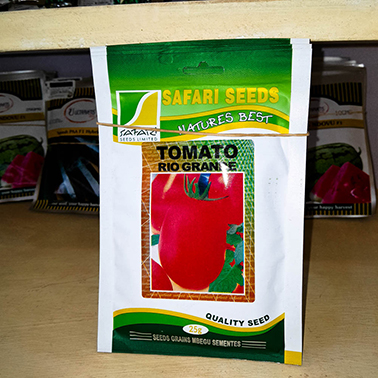
TOMATO RIO GRANDE
'Rio Grande' is a highly popular and widely adapted open-pollinated (OP) determinate tomato variety. It's especially well-known in regions with warm climates, including Kenya and specifically Meru County, where it's a common choice for both small-scale farmers and commercial growers. Here's a detailed description of the 'Rio Grande' tomato: General Characteristics: Type: Determinate (bush type). This means the plant grows to a specific height (typically around 90-120 cm or 3-4 feet), produces its fruit in a concentrated flush, and then largely stops growing. This makes it suitable for open-field cultivation and often doesn't require extensive staking or pruning, which simplifies management. Maturity: Medium-early to medium maturity, generally around 75-80 days from transplanting. Yield: Good yield potential, with estimates ranging from 12-16 tonnes per acre, though some sources indicate higher potential under optimal conditions. Adaptability: Highly adaptable to various growing conditions, including different climatic regions and soil types. It's particularly noted for its ability to withstand extremes in temperature, both hot and cool, making it robust in diverse environments like those found in Meru. Plant Vigor: Vigorous and compact plants with good foliage cover, which helps protect the fruits from sunscald. Fruit Characteristics: Shape: Distinctive elongated, oval, or pear-shaped (often described as "plum" or "paste" type). It's similar in shape to the Roma tomato. Color: Bright, rich red when fully ripe, with smooth, shiny skin. It's generally resistant to cracking. Size/Weight: Medium-sized fruits, typically weighing between 80-120 grams. Firmness: Known for its firm flesh and high solid content. This is a key characteristic that contributes to its excellent shelf life and transportability. Flesh: Meaty with relatively few seeds. Taste/Quality: Possesses a classic tomato flavor, often described as mildly sweet with a good balance of tartness. Its meaty texture makes it excellent for processing. Shelf Life & Transportability: Very good shelf life and ease of transport over long distances with minimal losses. This makes it a preferred choice for market sales. Disease Resistance/Tolerance: 'Rio Grande' is appreciated for its resilience and generally good disease package, often including: Verticillium Wilt (Vf): Resistance to this common soil-borne fungal disease. Fusarium Wilt (Ff): Resistance to this common soil-borne fungal disease (often Race 1 and 2). Good Tolerance to Bacterial Wilt: Important in many tropical and sub-tropical regions. Good Tolerance to Leaf Roll Virus: This helps maintain plant health and productivity. Good Heat Tolerance: As mentioned, its ability to set fruit in hot conditions is a significant advantage. Advantages for Growers in Meru (Kenya) and Consumers: Reliability: Its robust nature and adaptability make it a dependable choice for farmers in varying Meru microclimates. Market Appeal: The uniform shape, attractive red color, and firm texture make it popular for the fresh market. Processing Versatility: Its meaty flesh and good solid content make it ideal for sauces, pastes, purees, and canning, which adds to its economic value. Long Shelf Life: Reduces post-harvest losses, a crucial factor for farmers and traders. Ease of Management: Being a determinate variety, it requires less labor for staking and pruning compared to indeterminate types. Disease Tolerance: Reduces the risk of crop failure and the need for intensive chemical interventions, which is beneficial for both the environment and farmer economics.
(0/5)
Wishlist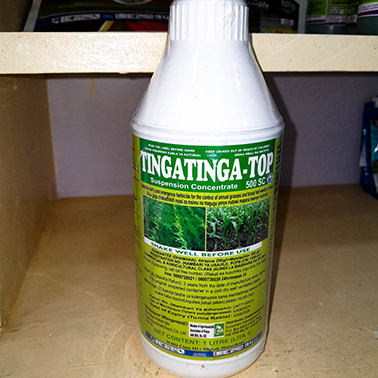
TINGATINGA-TOP 500SC
Selective early post emergence herbicide for the control of annual grasses and broad leave weeds in maize.
(0/5)
Wishlist